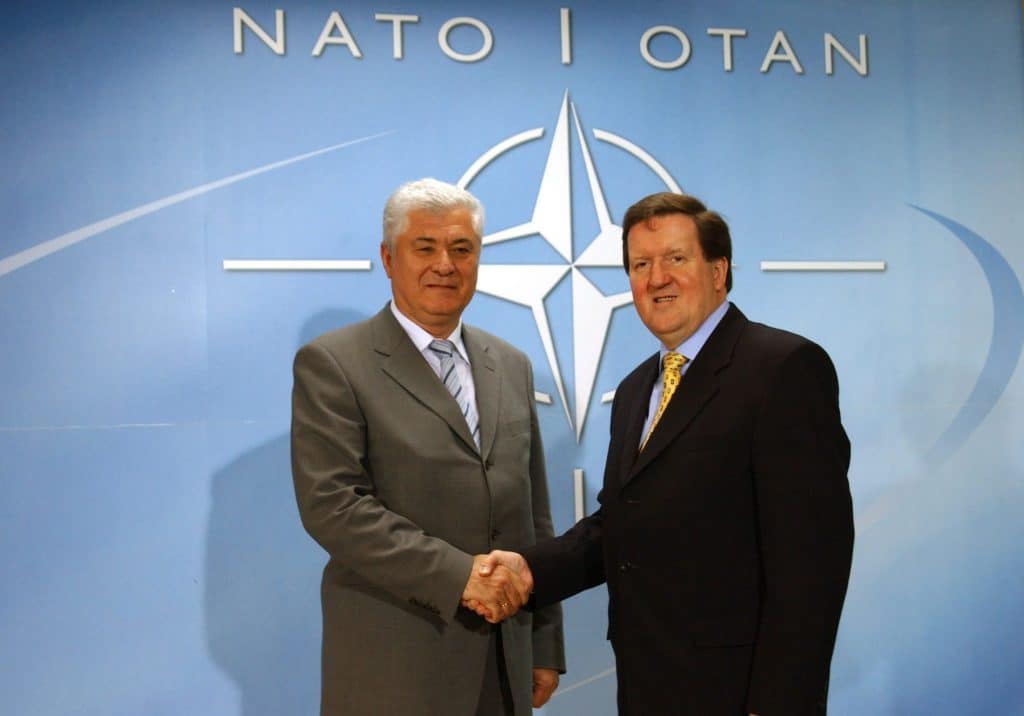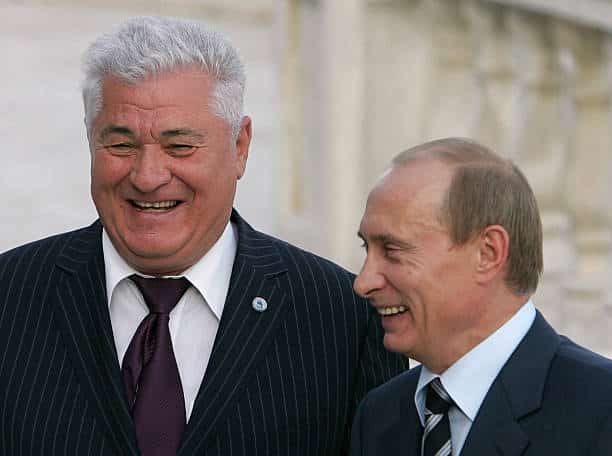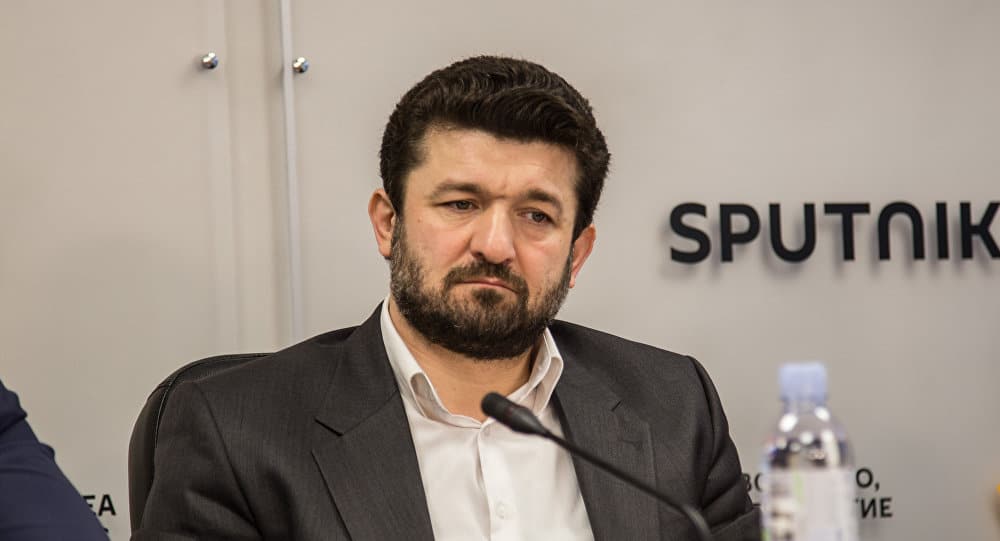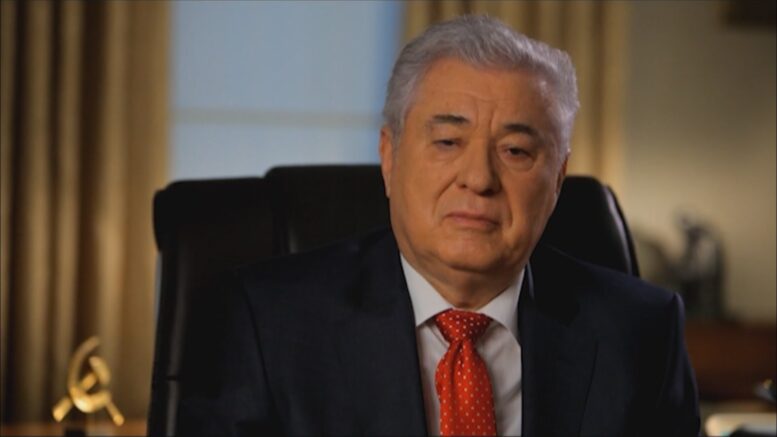The Fall and Rise and Fall of Moldova’s Communists
The following is part of a series of resources that seeks to explain Moldova’s current political situation through the biographies of the Moldovan politicians who helped shape it.
Also in this series:
- Introduction
- Early Moldovan Independence
- Presidential Crises 2009-2018
- The Rise of Vladimir Plahotniuc
- Recent Scandals and Fallout
Vladimir Voronin
Vladimir Voronin is the longstanding head of the Party of Communists of the Republic of Moldova (PCRM). With the country falling into chaos and civil war after independence, the Communists eventually staged a comeback. Voronin was Europe’s first democratically-elected Communist president, and he and his party ruled Moldova from 2001 until 2009. They remained the country’s primary opposition party until 2014 when a long-standing crisis caused a withdraw of resources and support and the party lost about half its seats.
Born in 1941, Voronin was raised by his mother; his father died shortly before his birth while fighting against the Soviet annexation of Bessarabia. From 1961 to 1991, Voronin worked as an administrator within various branches of the Soviet government and Communist Party of the Soviet Union while simultaneously pursuing degrees in the Academy of Social Sciences (graduated in 1983) and the Academy of the Ministry of Internal Affairs (graduated in 1991). Voronin became Minister of Internal Affairs of the Moldovan SSR in 1988 and strongly opposed protests advocating Moldova’s independence from the Soviet Union.
Moldova’s Communist Party was banned for more than two years following the dissolution of the USSR. In 1993, however, Voronin helped create a new communist party, the PCRM, and was shortly thereafter elected its leader. In 2001, pledging to resolve the crises they said the liberals had started, the Communists were swept to power with a supermajority. They then amended the constitution to have the president elected by parliament instead of through direct voting and voted their leader, Voronin as president.
During his presidency, Voronin attempted to pursue good relations with both the EU and Russia. Although he had some success, his objectives were often at cross purposes. For instance, he suggested that Moldova might both the EU and the Russia-led Eurasian Union and thus become a bridge between them. Most analysts, however, argued that it would be impossible to simultaneously abide by the requirements of both unions.

Then-President Voronin meeting with then-NATO Secretary General Lord Robertson in 2003.
Voronin was initially able to capitalize on the Transnistrian Conflict and stated that resolving it would be a major goal of his administration. However, he then refused to negotiate with Transnistrian government, which he publicly called a “transnational criminal group… deserving of an economic blockade.” He backtracked on a 2003 Russian-brokered settlement and eventually the conflict fully solidified into “frozen” status with Transnistria de-facto independent while de-jure still recognized as part of Moldova.
As the country’s problems continued under Voronin, the Communists lost their supermajority. In the April, 2009 parliamentary elections, the PCRM won 49.48 percent of the vote and 60 seats, just one too few for the PCRM to directly elect a president. The following day, Moldova’s parliamentary opposition accused the authorities of falsifying the vote and demanded new elections. They were supported by small protests across the country which quickly devolved into riots. Police responded with tear gas and water cannons. The protesters forced their way into the parliament building and presidential offices through broken windows, setting parts of both buildings on fire.
To calm the situation, Voronin called for a recount of the votes and, although the recount confirmed the original results, parliament was still left divided and unable to elect a president. Further, the violence from both sides during the protests had polarized the issue to the extent that one additional vote from either side for the other was now impossible.

Vladimir Voronin with Vladimir Putin in 2007.
With no resolution on the presidential vote, the constitution triggered a parliamentary snap election in July, 2009. This time the liberal Alliance for European Integration coalition won a small majority, but still not enough to pass a presidential candidate on its own. Voronin resigned his office and a 4-year constitutional crisis ensued with annual snap elections that each resulted in no majority large enough to name a president.
Support for the Communists continued to erode as the crisis dragged on. One of his party’s wealthiest and most powerful benefactors, Vladimir Plahotniuc, as well as an influential leader, Marian Lupu, defected to Democratic Party in 2009, sparking a rising exodus that has continued to the current day.
The constitutional crisis was resolved in 2014 when three Communist parliamentary deputies defected to the Socialists to vote for a new president against Voronin’s wishes.
In the 2014 elections, the Communists’ position in parliament was halved. They are now outnumbered by the new Socialist party which gained additional credibility by appearing more open to working with other parties in parliment and thus possibly ending the years of gridlock. In fact, the Socialists initially entered into negotiations with the Democratic Party to form a new majority left-of-center collation that promised to bridge the communist-liberal gap.
However, after a Socialist president was elected (see below), the two branches of government have been increasingly at odds and animosity has been building. Further, the Socialists, having left the PCRM on poor terms, does not work well with that party either. Thus, the remains shrinking and isolated.
In 2015, the exodus from the PCRM accelerated and it was announced that some 500 additional members, including parliamentary deputies and members of the its executive committee were leaving.
In 2017, another wave of party members and officials left the PCRM, including mayors and district heads, with most joining the Democratic Party of Moldova. One official from this latest wave complained that the PCRM was “on the verge of dismantlement, without constructive plans, without a clear direction to the future.”
As of January, 2018, the PCRM retains 21 sets, or about 20% of parliament. However, it is not likely that number will rise in the 2018 parliamentary elections. Voronin himself remains a member of parliament and the head of the PCRM, but at 78 years old and with his party disintegrating, his place in Moldovan politics is now limited.

Iurie Muntean is the favored successor to Voronin, should Voronin ever step down.
Iurie Muntean: The Future of the PCRM?
Serving as Moldova’s deputy Minister of Economy Trade from 2008 to 2009, a parliamentary deputy from 2009 to 2014 and currently the executive secretary for Moldova’s Party of Communists (PCRM), Iurie Muntean is one of the foremost political figures of the generation that came into adulthood amid the liberalization of the late 1980s and the chaos of the 1990s. He remains a favorite to succeed longstanding PCRM leader Vladimir Voronin.
Born in 1972, Muntean holds a law degree from Moldova State University in 1994, an MBA from Slovenia’s Bled School of Management in 2000. Before entering politics, Muntean spent nearly 15 years specializing in foreign economic relations and legal consultancy with foreign and domestic law, dividing his time between the Ministry of Economy and the Agency for Restructuring and Enterprise Assistance (ARIA). The latter was a joint EU and World Bank initiative aimed at transitioning Moldova to a market economy and stimulating development.
Muntean entered parliament in 2009 and joined the Committee on Economic Policy, Budget, and Finance. The following year, Voronin appointed Muntean executive secretary of the party and has since hinted that Muntean is the likely heir to the party chairmanship—which Voronin has occupied for two decades—simultaneously dispelling speculation that he would hand over leadership to his son, embattled businessman Oleg Voronin.
Within the party, Muntean is considered a moderate, a strong economic and foreign policy technocrat and supporter of European integration. Although he has consistently opposed reunification with Romania, a scandal erupted in March 2001 after he was allegedly photographed dancing to the famous Romanian song “Hora Unirii.” Muntean, however, denies the charge. In recent years, he has appeared in public wearing a t-shirt featuring the Moldovanist phrase “Еу сынт молдован! Еу грэеск молдовенеште! written in Cyrillic: “I am Moldavian, I speak Moldavian“).
It is possible that Muntean’s ascendency to the party leadership could help moderate and rebuild the party – if there is anything left of it by that time.


